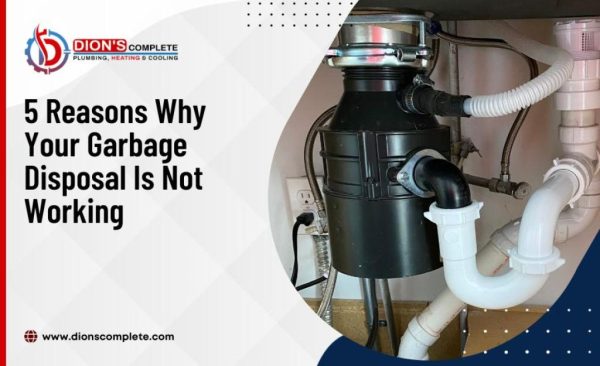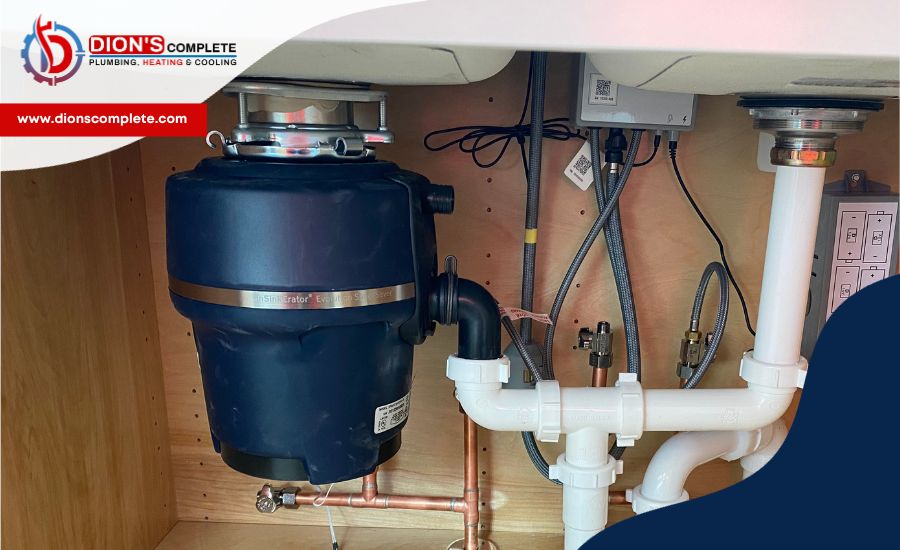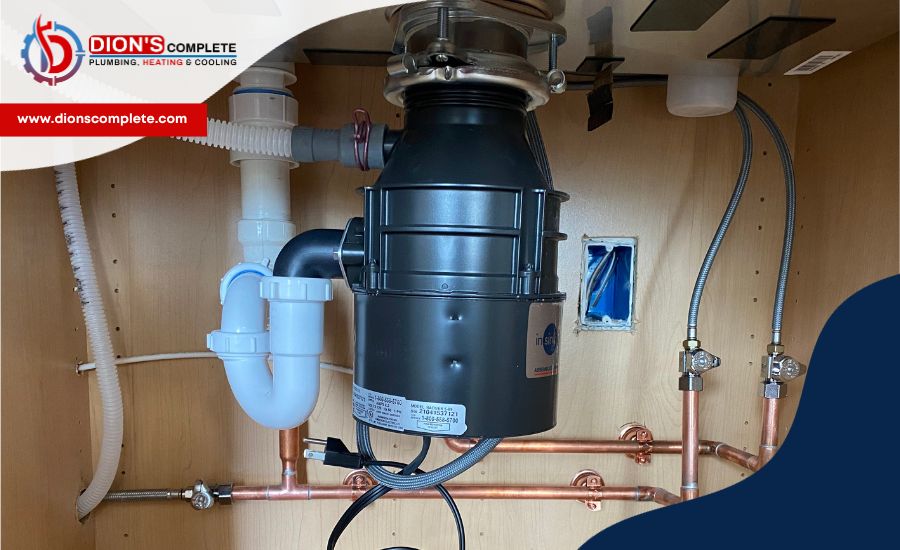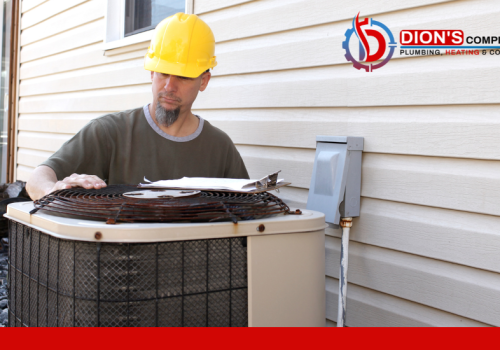Your kitchen's garbage disposal is a convenient appliance that plays a crucial role in keeping your sink clean and free from food scraps. However, like any other household device, it can develop issues over time. In this comprehensive guide, we will explore in-depth the five main reasons why your garbage disposal is not working as expected and provide you with practical solutions to address these problems effectively. We will also give you an idea of how our garbage disposal repair service can help.
1. Electrical Issues
If your garbage disposal has suddenly stopped working, you'll want to check for electrical issues first. Here's what you need to know:
- Ensuring the disposal is plugged in: Sometimes, the solution to a non-working garbage disposal is as simple as making sure it's properly plugged in. Look under your sink and confirm that the disposal is securely connected to its power source.
- The role of the reset button and its location: Most garbage disposals come equipped with a reset button. This button is a lifesaver when it comes to resolving minor electrical glitches. Be sure you know where this button is located, typically on the bottom of the disposal unit. If your disposal stops working, press the reset button to see if that solves the issue.
- Checking the circuit breaker and wiring diagram: If the plug and reset button don't work, it's time to inspect the circuit breaker and consult the disposal's wiring diagram. Locate your home's circuit breaker panel and check if the breaker connected to the disposal has tripped. Additionally, the disposal's wiring diagram, usually found in the user manual, can help you identify and troubleshoot any electrical issues.
- Potential need for replacing the disposal switch or outlet: In some cases, the problem may lie with the disposal switch or the electrical outlet it's connected to. If you've ruled out other issues, consider having these components inspected and replaced if necessary.
2. Jammed Flywheel and Grinding Mechanism
Understanding the workings of your garbage disposal's grinding mechanism is essential when addressing jamming issues. Here's what you should know:
- Description of the grinding chamber and its components: To effectively troubleshoot a jammed disposal, it's essential to know the anatomy of the grinding chamber and its various components. Inside the disposal, you'll find a rotating plate with sharp blades and a stationary grind ring. Food scraps are ground into tiny particles between these components.
- Symptoms of a jammed flywheel: Recognizing the signs of a jammed flywheel is crucial. Common symptoms include unusual noises, a disposal that won't turn on, or a disposal that gets stuck during operation.
- Safe methods to dislodge obstructions: When dealing with jammed disposal, safety should be your top priority. Never attempt to clear jams using your hands. Instead, follow these safe and effective methods:
- Use a disposal wrench: Most disposals come with a wrench designed to fit into the disposal's bottom. Rotate it to free up any obstructions.
- Use a wooden broomstick: If you don't have a disposal wrench, insert a wooden broomstick into the disposal and attempt to rotate the flywheel manually.
3. Overheating and Motor Issues
Understanding the potential causes of overheating and motor problems is essential for maintaining your garbage disposal. Here's what you need to know:
- Causes of overheating and its symptoms: Garbage disposals can overheat if they are used excessively or if they lack proper maintenance. Overheating can lead to an automatic shut-off to prevent damage. If your disposal has been running for an extended period and suddenly stops working, it might have overheated.
- Signs of a faulty motor and potential need for replacement: The motor is the heart of your garbage disposal. If it's not functioning correctly, it can lead to disposal problems. Signs of a malfunctioning motor include a humming noise without any grinding action or disposal that doesn't turn on at all. In such cases, consider consulting a professional to determine if a motor replacement is necessary.
4. Clogs and Drainage Problems
Clogs in the drainpipe can significantly impact your disposal's performance. Here's what you need to know:
- Identifying clogs in the drain pipe: Clogs in the drainpipe are a common cause of disposal issues. To identify them, look out for signs such as slow drainage or water backing up into the sink. If your disposal is connected to a dishwasher, ensure that its drain hose is not clogged.
- The dangers of using chemical drain cleaners: While it may be tempting to use chemical drain cleaners to clear clogs, these can harm your disposal and pipes. The harsh chemicals can corrode the disposal components and cause long-term damage. It's best to avoid them and opt for safer alternatives.
- Steps to clear sink clogs and maintain efficient drainage: Discover effective steps to clear clogs in your sink, ensuring that water drains efficiently and your disposal operates optimally. One common method is using a sink plunger to create pressure and dislodge the blockage.
5. Faulty Seals and Water Leaks
Water leaks can cause extensive damage to your kitchen. Here's what you need to know:
- Common places where leaks might originate: Water leaks can originate from various points in your garbage disposal system. Common areas include the flange that connects the disposal to the sink, the dishwasher connection, and the disposal's body.
- Steps to identify and fix leaks: Leak detection is crucial to prevent further damage. If you suspect a leak, carefully inspect the disposal's connections and seals. Tighten loose connections or replace damaged seals to address the issue promptly.
- Importance of regular maintenance to prevent leaks: Regular plumbing maintenance can significantly reduce the likelihood of leaks in your garbage disposal. Regularly inspect all connections and seals, tighten them if necessary, and replace any worn-out components. This proactive approach can save you from costly water damage repairs.
Maintaining Your Garbage Disposal
To ensure your garbage disposal remains in top condition, consider the following tips:
- Avoid putting fibrous or hard materials like bones or potato peels down the disposal. These items can cause jams and damage to the unit.
- Never dispose of non-food items or grease. Non-food items can lead to blockages, while grease can solidify and clog the pipes.
- Use cold water when running the disposal to prevent overheating. Cold water helps keep the disposal's components cool while aiding in the disposal of food scraps.
Trust Dion's Complete for Your Garbage Disposal Needs
When your garbage disposal encounters problems that you can't resolve on your own, it's essential to seek professional assistance. Dion's Complete, located in Brighton, Michigan, specializes in garbage disposal repair and replacement. With a team of experts who can diagnose and fix any issue you may face with your disposal, they are your go-to solution for reliable and efficient garbage disposal services.
In addition to garbage disposal services, Dion's Complete offers various related services to keep your kitchen running smoothly. Whether it's plumbing, appliance repair, or kitchen remodeling, you can rely on their expertise and dedication to customer satisfaction.
Frequently Asked Questions
Why is my garbage disposal making a humming sound but not working?
A humming sound typically indicates a jammed flywheel or motor issues. In such cases, it's recommended to contact a professional garbage disposal service provider for diagnosis and repair.
How often should I clean or maintain my garbage disposal?
Regular maintenance is essential for optimal garbage disposal performance. It's advisable to schedule maintenance checks with a professional garbage disposal service to ensure that your unit operates smoothly and efficiently.
Are there any foods or substances I should never put in my garbage disposal?
Yes, there are items you should avoid disposing of in your garbage disposal to prevent clogs and damage. Consult your garbage disposal service provider for a list of items to avoid.
How do I know if it's time to replace my garbage disposal unit?
If your garbage disposal consistently experiences issues, such as repeated jams, motor failures, or leaks, it may be time to consider replacing the unit. Contact a garbage disposal service provider to assess the condition of your disposal and provide recommendations.
What safety precautions should I take when trying to fix my garbage disposal?
Safety is paramount when dealing with garbage disposal issues. If you're attempting to troubleshoot or repair your disposal, always follow safety guidelines and consider seeking guidance or assistance from a professional Brighton garbage disposal repair service to ensure a safe and effective resolution.







